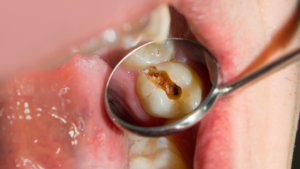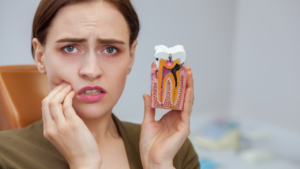Bad breath, or halitosis, is a common problem that many people experience at some point in their lives. It can be embarrassing, especially when you are unsure of the cause. One of the lesser-known causes of bad breath is cavities. Cavities, also known as dental caries, are holes in the teeth caused by bacterial decay.


- When bacteria feed on leftover food particles in the mouth, they release sulfur compounds that cause a foul smell and bad breath. This process is even more pronounced when a person has untreated cavities. The bacteria responsible for tooth decay reside in these cavities, breaking down food and producing gases that result in bad breath. When the depth of cavities increases the amount of bad breath also increase

- Another way cavities contribute to bad breath is by creating pockets in the teeth where food gets stuck. Even with regular brushing, small food particles can remain trapped inside cavities, rotting over time and leading to a persistent bad odor. If left untreated, cavities can spread deeper into the tooth, reaching the pulp where nerves and blood vessels are located. When this happens, an infection can develop, producing pus and an even stronger, foul smell.

Poor oral hygiene is one of the biggest reasons why cavities and bad breath occur. If you do not brush and floss regularly, plaque builds up on your teeth. Plaque is a sticky film of bacteria that feeds on sugar and starch from food, producing acids that erode tooth enamel. As the enamel weakens, cavities begin to form. The more cavities you have, the more places bacteria can hide and cause bad breath.
Dry mouth can also make cavities worse and increase bad breath. Saliva plays an essential role in washing away bacteria and food particles. When the mouth is dry, bacteria can grow unchecked, leading to both tooth decay and unpleasant odors. Certain medications, dehydration, or mouth breathing can reduce saliva flow, making it easier for bacteria to thrive and cavities to form.

One of the best ways to prevent bad breath caused by cavities is to practice good oral hygiene. Brushing your teeth twice a day with fluoride toothpaste, flossing daily, and using an antibacterial mouthwash can help remove food particles and bacteria from the mouth. Regular dental check-ups are also important, as your dentist can detect cavities early and provide treatment before they worsen.
The diet also plays a role in cavity formation and bad breath. Consuming too many sugary or acidic foods can speed up tooth decay, making it easier for cavities to develop. Instead, eating a balanced diet with plenty of fresh fruits, vegetables, and water can help protect your teeth and keep your breath fresh. Chewing sugar-free gum can also help stimulate saliva production, reducing the risk of dry mouth and cavities.
If you have persistent bad breath despite maintaining good oral hygiene, it is important to visit a dentist. They can check for hidden cavities, gum disease, or other underlying issues that might be causing the problem. In some cases, bad breath may not be related to oral health but rather to digestive issues, infections, or other medical conditions. A professional evaluation can help determine the exact cause and provide the best treatment.

In conclusion, cavities can be a major cause of bad breath due to bacteria buildup, food entrapment, and potential infections. Taking care of your teeth through proper oral hygiene, staying hydrated, and seeking timely dental treatment can help prevent both cavities and the unpleasant breath that comes with them. If you struggle with persistent bad breath, addressing cavities and other dental issues is an essential step toward achieving a fresh and healthy mouth.

